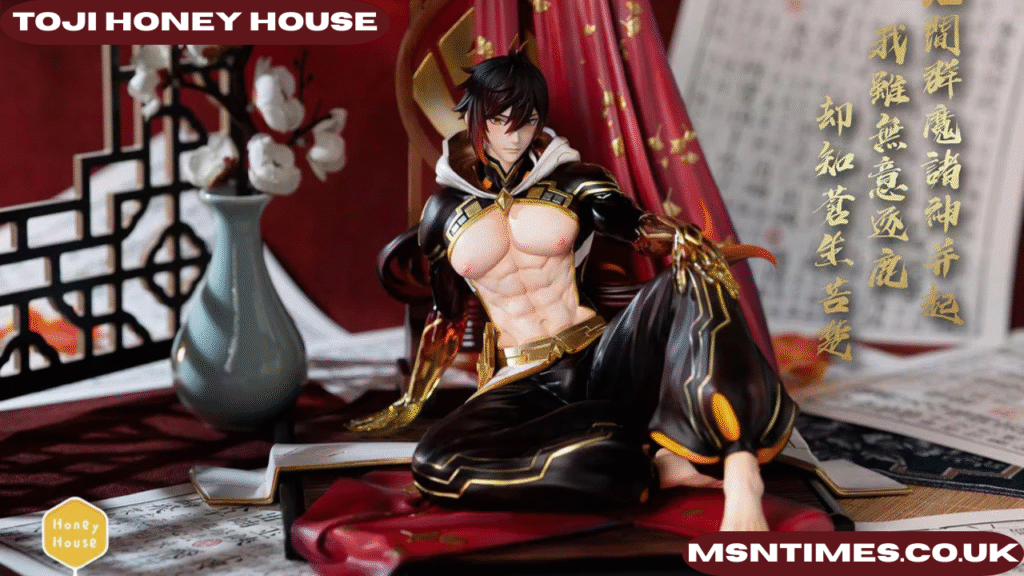Introduction: What Is Toji Honey House??
In recent years, a name that has quietly made waves among honey enthusiasts, natural remedy seekers, and cultural travelers alike is Toji Honey House. But what exactly is Toji Honey House?? Is it simply a place that sells honey, or is there more to the story? The truth is, Toji Honey House isn’t just a honey retailer or a typical apiculture establishment. It’s a destination—an experience steeped in craftsmanship, nature, wellness, and, quite often, mystique.
Whether you’re someone who swears by raw honey as a daily supplement or a traveler drawn to charming countryside treasures, Toji Honey House stands out for reasons that go beyond a simple jar of golden nectar. This article explores every facet of this intriguing topic—from its likely origins to its honey-making practices, wellness appeal, and cultural footprint.
The Mystery Behind the Name: Toji Honey House??

When people first encounter the phrase Toji Honey House??, the question marks are understandable. The name evokes curiosity. “Toji” itself might be mistaken for a brand, a personal name, or even a cultural reference. In Japanese, “Toji” can relate to several things, such as the winter solstice or even a temple, depending on the context. This has led many to speculate whether Toji Honey House is inspired by Eastern philosophies, seasonal traditions, or perhaps a namesake with deep roots.
Adding to the intrigue is the “Honey House” component, suggesting a physical location or cottage-style setup where honey is produced, stored, or sold. The double question marks in searches like Toji Honey House?? are not just about uncertainty—they’re a call for clarity about what makes this place so unique.
A Closer Look at What Toji Honey House Offers

While information may sometimes be sparse or vary depending on the region referencing it, consistent themes about Toji Honey House include:
- Raw and Organic Honey Products
- Small-batch, artisanal production
- Focus on sustainability and natural beekeeping methods
- A possible onsite or remote visitor experience
Unlike mass-market honey manufacturers that often dilute honey with additives or process it to the point of removing its natural health properties, Toji Honey House has become associated with purity. Their offerings, as reported by those who have come across the name, are more than consumables—they’re health-oriented products deeply tied to their environmental and cultural settings.
Why “Toji Honey House” Feels Like More Than a Brand
There’s something deeply wholesome and emotionally resonant about the term Toji Honey House. It conjures up imagery of a rustic retreat nestled in the mountains or tucked away in a valley, where bees buzz freely and the air smells of wildflowers. This connection to nature isn’t just poetic—it’s practical. Beekeepers who work in harmony with the environment understand that the health of their bees reflects the health of their land.
People exploring Toji Honey House?? might be doing so for different reasons:
- Health-conscious buyers looking for unprocessed honey
- Cultural travelers hunting for unique, immersive experiences
- Natural product advocates seeking transparency in ingredients
- Curious netizens trying to verify if it’s a real place or brand
In any case, Toji Honey House has transcended being just a supplier and become something of an emblem for a more mindful, harmonious way of living.
Beekeeping Methods and Purity Standards
One of the core reasons Toji Honey House has gained attention is due to its believed commitment to authentic beekeeping. Here’s what that generally means when a place is described this way:
- No pesticides: Bees collect nectar from wild or organic floral sources.
- No artificial feeding: Bees aren’t fed sugar water to increase production artificially.
- Cold extraction: Preserves the nutrients and enzymes in the honey.
- Traceability: Consumers can know where the honey comes from, down to the specific region.
If Toji Honey House follows or is associated with these principles, then it’s no wonder people are increasingly interested. More consumers than ever want to ensure their food and wellness products are free from chemicals, ethically produced, and environmentally sustainable.
Cultural and Regional Connection of Toji Honey House??
Another compelling angle is how Toji Honey House may tie into regional or cultural traditions. For instance, if “Toji” indeed refers to the winter solstice, then honey production from Toji Honey House could be seasonally significant. In many Asian cultures, specific honeys are harvested at certain times of the year for their medicinal properties, particularly in holistic healing systems like traditional Chinese medicine or Ayurveda.
This seasonal and cultural association adds a layer of authenticity and spiritual wellness to what might otherwise be seen as a common product. It invites consumers not just to buy honey, but to understand the story of its origin—of time, place, people, and bees.
Health Benefits Tied to Toji Honey House
Though honey in general is known for its benefits, any artisan honey producer like Toji Honey House would be celebrated for maximizing those qualities. The benefits include:
- Antibacterial and antiviral properties
- Natural energy boost
- Support for digestive health
- Skin healing when used topically
- Natural cough suppressant and sore throat relief
When sourced from wildflowers or unique herbal plants, honey can even carry specialized medicinal benefits. The belief that Toji Honey House delivers such specialized varieties gives it credibility among health-conscious circles.
Customer Experience and Emotional Connection
For many, buying from a place like Toji Honey House isn’t just a transaction—it’s an emotional journey. People love brands and places that feel “alive,” and Toji Honey House appears to embody warmth, nature, community, and tradition. Even if it operates as an online boutique or a small-scale farm, the emotional resonance is high.
Buyers often describe such experiences with words like:
- “It felt like bringing nature home.”
- “You can taste the earth in it.”
- “A jar of peace and purity.”
This intangible connection plays a big role in why Toji Honey House?? continues to be searched, talked about, and desired.
FAQs About Toji Honey House
Q: Is Toji Honey House a real place or a brand?
A: Based on the context and references, Toji Honey House is believed to be either a niche brand or a culturally themed honey source. It may also refer to a real physical location where honey is produced naturally.
Q: What makes Toji Honey House different from other honey brands?
A: Its emphasis on small-batch production, purity, possible cultural ties, and emotional branding sets it apart.
Q: Why is there confusion around the term “Toji Honey House??”?
A: The double question marks reflect the public’s curiosity and uncertainty—people want to know whether it’s a place, a product line, or something else entirely.
Q: Does Toji Honey House produce raw honey?
A: While not officially confirmed, most references suggest that Toji Honey House is associated with raw, organic, or natural honey.
Q: Can I visit Toji Honey House in person?
A: That depends on its actual location. If it exists as a physical space, it may offer tours or sell directly to visitors, especially if it aligns with eco-tourism or cultural tourism practices.
Final Thoughts: Toji Honey House?? A Mystery Worth Unpacking
To sum it all up, Toji Honey House isn’t just a brand name—it’s a concept rich with layers of meaning, intention, and curiosity. Whether it’s known for producing the finest natural honey, embodying seasonal cultural traditions, or simply evoking a dreamlike pastoral lifestyle, Toji Honey House?? taps into something much deeper than consumerism.
ALSO READ : Comprehensive Guide to Linden Medical Centre Kettering:
